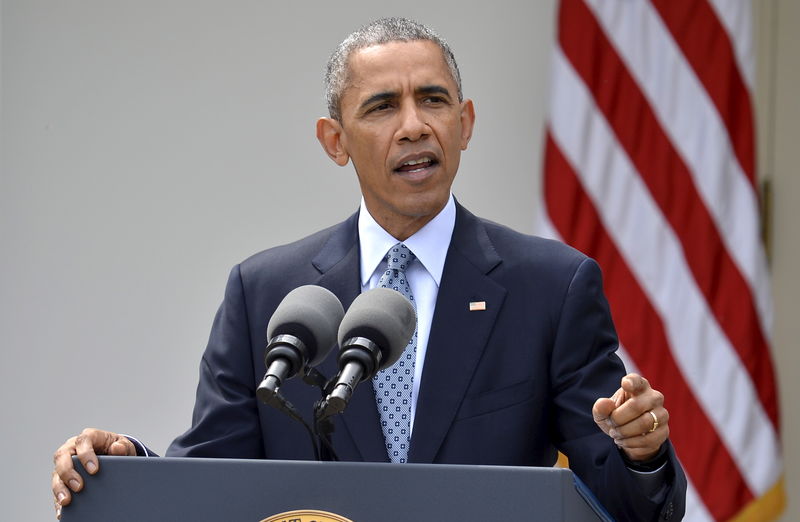By Matt Spetalnick
WASHINGTON (Reuters) - U.S. President Barack Obama still faces a formidable task in preventing a skeptical Congress from sabotaging a nuclear pact with Iran and keeping talks from collapsing over the fine print, despite achieving a surprisingly detailed initial agreement that he hailed as "historic."
While major world powers and Iran made genuine progress in reaching a broad agreement in Switzerland on Thursday, the real test looms at the end of June when the deal must be finalized.
"This is an encouraging development, but of course the devil lies in working out the details," said Edwin Lyman of the Washington-based Union of Concerned Scientists, a nonprofit group that is typically highly critical of nuclear power.
The marathon talks in Lausanne had been finely balanced between success and collapse, and Obama himself cautioned on Thursday that "success is not guaranteed" despite the agreement.
Obama's Republican rivals showed no signs on Thursday of retreating from plans to propose legislation that Obama says would undermine the talks, including a bill requiring that any final deal be approved by the Republican-controlled Congress.
U.S. Senator Marco Rubio, a prospective presidential candidate, called the initial terms of the Iran deal "very troubling" and vowed to work to impose additional sanctions.
But Obama's hand in Congress could be strengthened by the surprisingly detailed content of the framework deal, although many key points still have to be agreed.
Under the outline deal, Iran would shut down more than two-thirds of its installed centrifuges capable of producing uranium that could be used to build a bomb, dismantle a reactor that could produce plutonium, and accept intrusive verification.
Iran also agreed to significantly reduce the number of installed uranium enrichment centrifuges it has to 6,104 from 19,000 and will only operate 5,060 under the future agreement with the six powers, according to a U.S. fact sheet.
"The big question is whether it is specific enough to meet the demands of congressional critics and vague enough that the Iranians can argue to their own public that they have not given way the store," said Jon Alterman, director of the Middle East program at the Center for Strategic and International Studies in Washington.
INTRACTABLE ISSUES
Among the most difficult technical issues remaining are how Tehran would modernize the Arak heavy-water reactor and Fordow underground sites. Under Thursday's deal, Iran agreed to render both incapable of producing bomb-grade material.
With Arak's potential to yield plutonium - which like highly-enriched uranium can fuel nuclear weapons - the West has sought to have it scrapped or converted to a less proliferation-prone, light-water plant. Iran has said the reactor would only produce radio-isotopes for medicine and agriculture, and has long ruled out closing it down.
How exactly Iran will rebuild and redesign Arak could prove contentious.
Western officials would like Fordow, whose enrichment halls are buried 300 ft (91 meters) underground, converted into something that has nothing to do with enrichment. Under the deal, Iran agreed to not enrich uranium at Fordow for at least 15 years and to use it only for "peaceful purposes".
But defining "peaceful purposes" could prove challenging. Tehran had insisted on the right to conduct advanced centrifuge research there.
Another issue that could trip up negotiations between now and June is the timing for lifting U.N. sanctions on Iran, which include bans on trade in nuclear and missile technology and an arms embargo.
Under Thursday's agreement, Iran will gradually receive relief from U.S. and European Union nuclear sanctions as it demonstrates compliance with the future comprehensive agreement.
Some U.N. Security Council sanctions would be gradually lifted, though others would remain in place, specifically those relating to proliferation. Iran had wanted all United Nations sanctions lifted immediately.
But while failure to comply with terms of the deal will cause the U.S. and EU sanctions to "snap back into place", the U.S. "fact sheet" released after the agreement did not specify how U.N. sanctions would be reimposed.
U.S. and European negotiators have wanted any easing of U.N. sanctions to be automatically reversible - but the so-called "snapback" has been opposed by Russia because it would undermine its veto on the Security Council.
The nuclear diplomacy is central to Obama's foreign policy in the chaotic Middle East, where Tehran stands at the center of sectarian conflicts ranging from Syria to Iraq to Yemen and has also upset Washington's ties with Israel.
Obama faces the challenge of calming Israel, which sees Iran's nuclear program as an existential threat and has previously hinted it might attack Iran's nuclear sites if it believes Tehran is making a dash to build an atomic bomb in defiance of any eventual final deal.

"Iran's behavior in Syria and Iraq and Yemen, all of those places, is going to continue to muddy the waters for Obama in the Middle East," said Aaron David Miller, a former Middle East negotiator for Republican and Democratic administrations. "But there may be enough traction here to get to the next phase of negotiations."